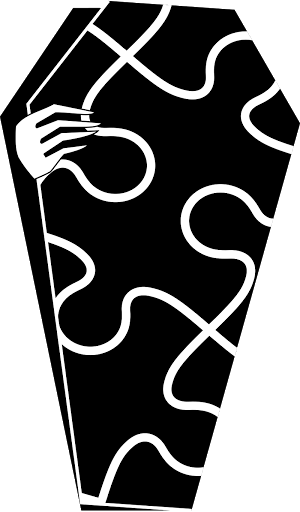
Like editing, solving puzzles is often a solitary endeavour. But not always! On the second Tuesday of every month, people get together in pubs across North America, Europe and beyond to solve puzzles at an event called Puzzled Pint. When I started going a few years ago, I never guessed that these entertaining nights out would lead to an exciting creative challenge and insights into my own editing career.
Puzzled Pint puzzles are different from standard crosswords or Sudokus in three key ways. First, they often do not provide instructions — part of the puzzle is figuring out how to solve it. Second, each set is based on a theme, such as Alice in Wonderland, Game of Thrones or Sherlock Holmes. Third, you use the solutions from the first four puzzles to solve a final puzzle — the metapuzzle.
Having enjoyed these inventive puzzles month after month, I started itching to write my own set. I decided on a Dracula theme and worked on my ideas for several months, producing a set of puzzles that I felt pretty good about. I sent them in and waited, imagining a glowing response approving my puzzles for release with perhaps a few minor tweaks.
As an experienced developmental editor, I should have known better.
What followed was a challenging, humbling and enlightening experience. Puzzled Pint has established a rigorous process for editing their puzzles, which is particularly impressive when you realize it’s an entirely volunteer-run organization.
The process begins when a puzzle submission comes in and an editor is assigned. My editor, Neal Tibrewala, analyzed each of my puzzles based on his attempts to solve them. His emails were friendly and diplomatic, but, having written emails like these myself, I could read between the lines: I had a lot of work to do. Neal and I collaborated on the puzzles one by one — I sent him revisions and he gave suggestions — until we arrived at versions we were both happy with.
The puzzles were now ready for the next step: playtesting. Neal sent a link out to the volunteers who run Puzzled Pint events in each city. They attempted to solve them, giving each one a “fun” and “difficulty” rating and providing comments. Neal analyzed the feedback to present me with a summary of the scores and a representative set of comments. After several more rounds of revisions, the puzzles went to QC for a final polish.
I have come out of this process not only with a better understanding of how to construct puzzles, but with some reminders about good developmental editing practices that will help me in my own work. Key among these is the importance of knowing your audience and purpose. Puzzled Pint’s clear idea about who their puzzles are aimed at (tipsy beginners) allows their editors to focus their comments and efficiently interpret playtest results. Being on the other side of the editor-author relationship also reminded me what it’s like to be edited. It’s easy to forget how vulnerable you feel when you open yourself up to criticism, however kind and skilful, of something you have made and are proud of.
Tonight, two thousand or so people will be tackling my Dracula puzzle set. Thanks to my talented editor and a well-defined testing process, I can relax and enjoy the evening, knowing my puzzles won’t bite.
~~~
The Editors’ Weekly is the official blog of Editors Canada. Contact us.
Discover more from The Editors' Weekly
Subscribe to get the latest posts sent to your email.
